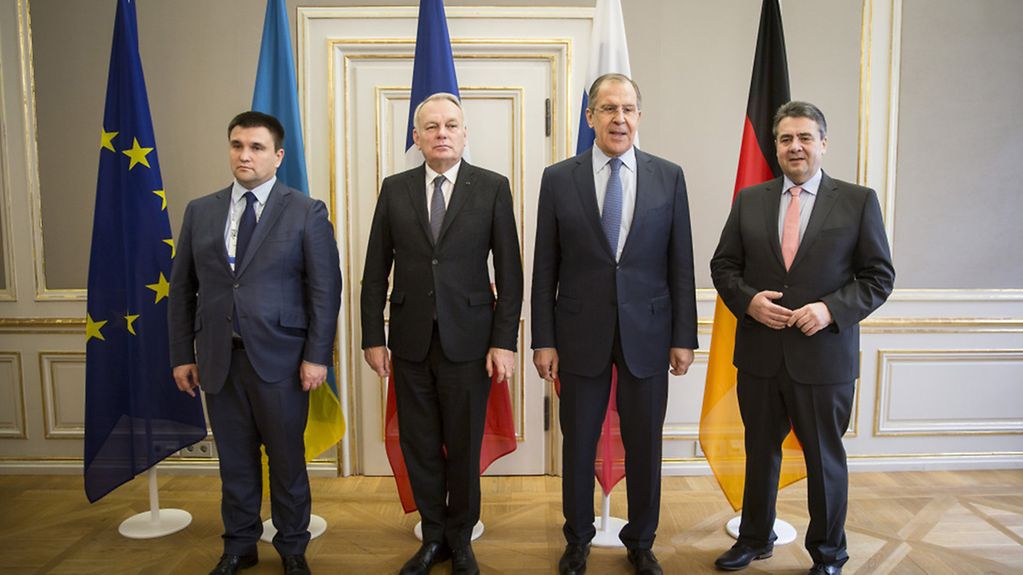Ukraine conflict
The priority is still compliance with the ceasefire and the withdrawal of heavy weapons from eastern Ukraine. On this point the foreign ministers agreed after their Normandy format meeting.
2 min reading time

The ministers of foreign affairs of Ukraine, France, Russia and Germany have met for Normandy format talks
Photo: Florian Gaertner/photothek.net
Federal government spokesperson Steffen Seibert described the decree of the Russian government regarding the identity documents issued by separatists as "unacceptable".
Recognition of the travel documents issued by the self-styled "people’s republics" in Luhansk and Donetsk undermines the unity of Ukraine, stated government spokesperson Steffen Seibert at the government press conference. "This is in complete contradiction to everything that was agreed in Minsk and is thus entirely unacceptable," he said.
Legally dubious measure
On Saturday (18 February) Russia issued a decree relating to the recognition of identity documents issued by the self-styled "people’s republics" in eastern Ukraine. According to Federal Foreign Office spokesperson Martin Schäfer this is a clear contravention "of the spirit and the objectives of the Minsk agreements". With the decree, Russia is undermining the sovereignty, the territorial integrity and the unity of Ukraine – values which Germany fully supports.
"We see this step of the Russian Federation as something that is counter to the objective," stated the spokesperson clearly. Given the current legal situation, recognition of the so-called "passports" issued in Donetsk and Luhansk is extremely dubious.
Russia’s President Vladimir Putin issued a decree on 18 February, recognising the validity of identity documents issued by the separatists in eastern Ukraine. The Russian Federation will recognise these as travel documents entitling the holder to enter Russia. Legally, this step contradicts the Minsk agreements, which aim, inter alia, to restore the full sovereignty of Ukraine over all of its territory – including the Donbas in the east of the country.
The situation of the civilian population should not be worsened
With a view to the situation of the civilian population, Steffen Seibert appealed, on behalf of the German government, to those parties in Ukraine, who are currently blockading the most important railway connection to Donbas. "The appeal must be to end this blockade immediately."
Measures like this not only hamper efforts to resolve the conflict peacefully. "It also harms electricity supplies in Ukraine, because the coal that is needed to generate power cannot be supplied. And it makes it even more difficult to supply the people with what they need. That cannot really be the intention of anyone," warned the federal government spokesperson.
Minsk agreements remain the basis
Federal Foreign Office spokesperson Martin Schäfer added that the German government appeals "urgently to the parties to the conflict" i.e. to Russia and the Ukraine, to "genuinely implement" the Minsk agreements. That is the only way to prevent any further military escalation of the conflict.
As agreed two years ago in Minsk, heavy weapons are to be withdrawn, especially from areas where there have been repeated serious ceasefire violations. The call goes to those in Kyiv and Moscow that have influence over the parties to the conflict, said Martin Schäfer. They should ensure without delay that the agreements reached when the ministers of foreign affairs met on Saturday (18 February) "are now finally translated into practice".